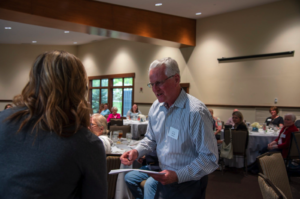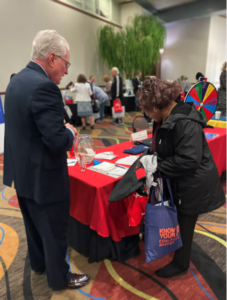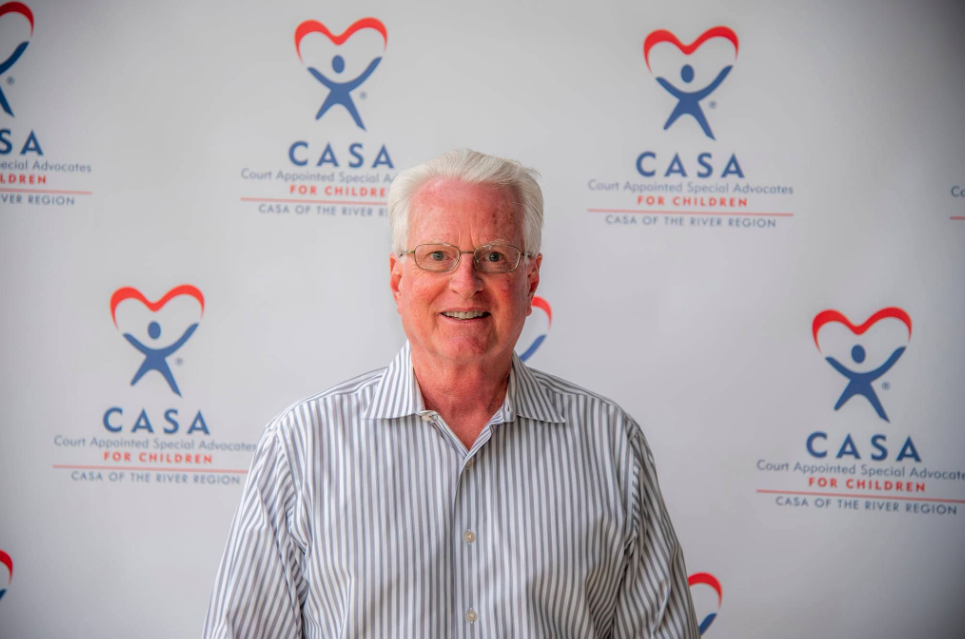David Hopkins Finds Fulfillment Through Local CASA Volunteerism
Writer / Grace Schaefer
Photography Provided
 There’s a special gentleman who never had children of his own, and who reaches out to some of Kentucky’s most vulnerable residents to change their lives for the better — David Hopkins. To some, this volunteer is known as Uncle Dave, and he’s certainly a favorite uncle if ever there was one. Yet the beginning of his volunteer service was unplanned – a coincidence too perfect to be anything short of a blessing.
There’s a special gentleman who never had children of his own, and who reaches out to some of Kentucky’s most vulnerable residents to change their lives for the better — David Hopkins. To some, this volunteer is known as Uncle Dave, and he’s certainly a favorite uncle if ever there was one. Yet the beginning of his volunteer service was unplanned – a coincidence too perfect to be anything short of a blessing.
Years ago, David Hopkins attended a judicial conference while working for KASPER (Kentucky All Schedule Prescription Electronic Reporting), a prescription monitoring system. Directly across from the KASPER exhibit was a Court Appointed Special Advocates (CASA) booth, and in the course of the day he spoke with their representative. CASA helps by providing volunteer, court-appointed advocates for neglected and abused children in family court. Hopkins loves children, and the introduction to CASA stayed in his mind.
“I’ve had a good life and I’ve been fairly fortunate,” Hopkins says. In 2019, as he neared retirement, he filled out an application for the program. After the staff considered his credentials, devoid of experience with children, he expected a kind yet brief rejection. It came as a surprise, then, when Shari Christoff invited him for an interview. Hopkins was approved for volunteer work and completed training between October and mid-November. His first assignment began in December.
CASA volunteers usually begin their first case with a home visit, where they become acquainted with their assigned children and home environment. Along with a supervisor, Joseph Grove, Hopkins walked into a dilapidated trailer without central heating. Outlets were broken, the home was dirty, and the children were unclean. To a volunteer familiar with the reality of neglect, the home would have been a difficult sight. To Hopkins, who had no such experience, the condition was eye-opening, unbelievable and unacceptable. The children could not remain in their home. Although the decision to remove his first wards from their parent and home was painful, the willingness of a single volunteer to work courageously for those children blessed their future prospects in ways they could scarcely imagine from the cold, dirty trailer.
Hopkin’s first case is no rarity. In fact, Kentucky has ranked number one in child abuse and neglect rates in the United States for three consecutive years. Out of every 1,000 children in Kentucky, 22 will be subject to abuse. The living conditions of these children will give them “little to no opportunity to thrive,” according to Hopkins, who is disheartened by both his own cases and those managed by his fellow volunteers. The stories and statistics are truly bleak, yet rays of hope shine through CASA volunteers, working with the more than 3,800 children annually in the family courts of their six service counties.
 This impact can grow as the organization gains additional service members. Anyone can make a difference, even those who believe they have nothing to offer such an agency. As Hopkins found, prior experience with children isn’t always a necessity. Specifically for those transitioning to retirement, he notes that volunteering is a fulfilling way to spend time. No matter what interests an individual, there is a volunteer opportunity available to utilize their gifts. A willing heart and a desire to give back to others is the cornerstone of service, and no matter what volunteer work stems from it, that work will have the potential of blessing others.
This impact can grow as the organization gains additional service members. Anyone can make a difference, even those who believe they have nothing to offer such an agency. As Hopkins found, prior experience with children isn’t always a necessity. Specifically for those transitioning to retirement, he notes that volunteering is a fulfilling way to spend time. No matter what interests an individual, there is a volunteer opportunity available to utilize their gifts. A willing heart and a desire to give back to others is the cornerstone of service, and no matter what volunteer work stems from it, that work will have the potential of blessing others.
Yet serving doesn’t just benefit those who are served. Such work helps both the volunteer and their community. Volunteers are reported to be healthier than their non-volunteering counterparts, and serving others may reduce the risk of stroke and heart disease by reducing stress levels. Additionally, the community involvement often fostered through volunteering can improve the function of a local community as a whole. Community engagement leads to the increased inclusion of marginalized groups within the local area, as working together can show neighbors just how much they have in common.
Additionally, engagement increases community members’ knowledge of local issues, along with the likelihood of creating effective and acceptable solutions to such problems. In the sphere of child abuse and neglect, keen focus on the details of the problem and its possible solutions is essential for lasting effects. Through an engaged community partnering with organizations like CASA, real and permanent change is possible. There is indeed hope that Kentucky will lose its heartbreaking national ranking.
This progress comes from everyone. For those who can’t serve through CASA, vigilance is one of the best ways to help. “Pay attention,” Hopkins urges. “Be alert. If you see something that concerns you, do something.” Do not turn a blind eye to children who are poorly dressed for the season, or who go unsupervised for long periods or in dangerous situations, as these are common warning signs of abuse or neglect. Bring concerns to the attention of the children’s parents or local child protection agencies. “Don’t let it continue,” Hopkins says. “Reach out to help.”
 Hopkins says Kentucky needs more foster families. He praises the foster parents who care for his wards in two cases, and hopes to see more kind families join their ranks soon. In addition, Hopkins wants to rally greater support for CASA’s cause and for the children they mentor. In particular, he urges greater support for the St. Matthews area, but no matter where a volunteer serves, he says he is certain they will find “a wonderful opportunity to help” through CASA. When asked what message he would like to give potential volunteers, Hopkins speaks of just how fulfilling the process is. “It is very, very rewarding to be able to help these children and see how their lives can be turned around,” he says.
Hopkins says Kentucky needs more foster families. He praises the foster parents who care for his wards in two cases, and hopes to see more kind families join their ranks soon. In addition, Hopkins wants to rally greater support for CASA’s cause and for the children they mentor. In particular, he urges greater support for the St. Matthews area, but no matter where a volunteer serves, he says he is certain they will find “a wonderful opportunity to help” through CASA. When asked what message he would like to give potential volunteers, Hopkins speaks of just how fulfilling the process is. “It is very, very rewarding to be able to help these children and see how their lives can be turned around,” he says.
For Hopkins, there is truly no better word for his work than rewarding. Speaking about the CASA organization, he emphasizes that “our job is to look out for the best interest of those children.” The joy and passion in his voice as he speaks about Kentucky’s youth certainly emphasizes his care. Thus far he’s served seven children, remaining grateful for the happy resolutions of his first two cases and looking forward to continuing on with his current ones. When he visits his first charges – now back with their mother – he sees a great change. Where there was once a worn-down trailer, there is now a well-kept apartment. Where there were once three neglected children, there are now three clean and cared-for little ones who affectionately call him Uncle Dave.
“They are thriving in a good environment,” Hopkins says. “If there’s ever been something I can be happy with, it’s the outcome of that case.” Their lives have been changed for the better by the willingness of one volunteer to share a little time. Though beginning may be difficult and the process may not always be easy, the benefits of volunteering will forever be far-reaching and worthwhile. And though he is only one volunteer in a needy world, the impact he’s made and the relationships he’s forged are, to Uncle Dave, “as rewarding as anything could be.”
For more information about volunteering with CASA, visit casariverregion.org, or attend an in-person or online no-commitment CASA 101 session.





